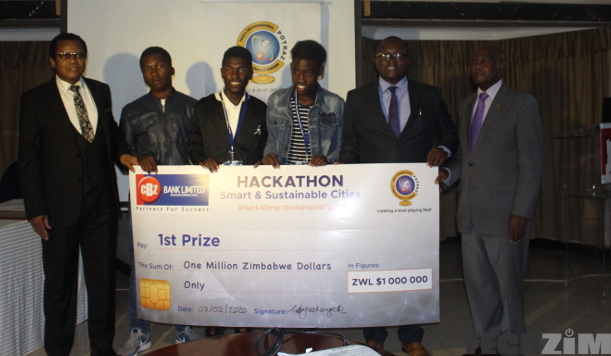Students from Chinhoyi University of Technology walked away with $15 000 for themselves and $1M for their university’s innovation hub after winning POTRAZ’s inaugural Hack4SmartSustainableCities.
The team consisting of Christopher Chinyamakobvu, Gordon Muneka, and Elvin Kakomo developed an emergency response application that allows users to call for medical services after a car crash.
The application has a panic button that users can hit for minor accidents. In the case of more serious emergencies which incapacitate the driver and passengers, it then uses the sound of the car crash to automatically trigger the panic button. The team has managed to develop an algorithm that can differentiate the sound of a head-on car crash from something like a car crashing into a trash can and
From the $1 million going to CUT, $200k will be used to further develop the trios application, whilst each member of their group will walk away with $5000 each.
In second place was the University of Zimbabwe, who developed a system that allows households using solar power to provide power to the national grid. The system will have” smart meters” which can allow households to sell their excess electricity at different prices depending on the demand for electricity at that particular time of the day.
They will also get $200 000 -from the university’s 700k -to further develop the idea, and the 3 students from UZ will share $12 000.
HIT came in third, with their students pitching Lifeline Medical – a database that they hope will be used to improve local healthcare. The database will compile accurate statistics of diseases affecting citizens along with storing health records for zimbos. Lifeline’s concept is similar to a project that the government recently announced will be carried out locally by experts from the UAE and Cyprus.
The Harare Institute of Technology’s innovation hub will get $500 000, $200 000 of which will be used to develop Lifeline Medical. The 3 students behind the innovation will get $9000 they’ll share among themselves.
The Hack 4 Sustainable Smart Cities is part of POTRAZ’s innovation drive and one of the more encouraging signs was POTRAZ finally sharing how much finalists are getting to develop their ideas – something they didn’t do in the past.
The hackathons are a great platform to encourage local development of solutions and by offering these 3 teams 200 000 to develop their solutions, they’ll ensure that the issue of raising funding to get off the ground is something these students don’t have to battle with.

What’s your take?